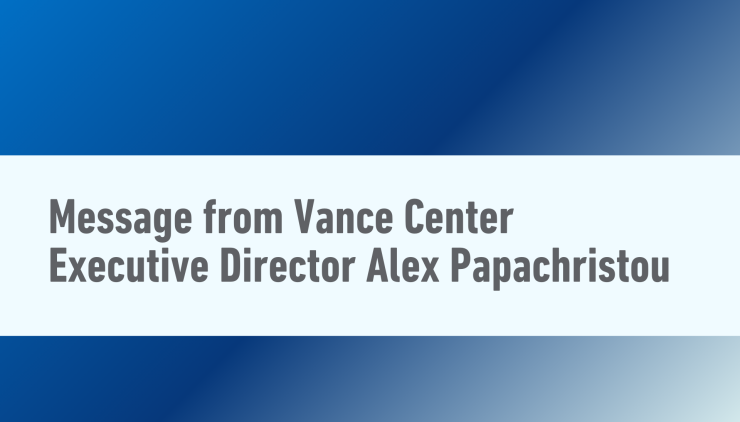This website uses cookies so that we can provide you with the best user experience possible. Cookie information is stored in your browser and performs functions such as recognising you when you return to our website and helping our team to understand which sections of the website you find most interesting and useful.
Message from Vance Center Executive Director Alex Papachristou
February 2025
This week, the National Public Radio show On Point invited me to speak about the freezing of US foreign aid and the shutdown of USAID, and what they mean for our international community. This conversation couldn’t be timelier, or more urgent. These events have preoccupied me since the January 20 executive order freezing all foreign aid, and I’ve only grown more concerned as each day has brought more notices and orders instructing our clients that projects should be paused, put on hold, or shut down entirely. We’ve received these messages, too. Yes, the Vance Center has lost some federal funding for several projects: not a debilitating loss, but still a meaningful one.
However, many of our clients face a far more dire outlook. Some of the larger ones will lose millions of dollars, and many smaller organizations are looking at a total wipeout of funding. Many are unsure if or how they will survive. Last week I joined an urgent call with 132 journalism and journalism support organizations around the world, all struggling to understand what immediate suspension of their funding really meant. Another group of environmental organizations has set a call for this week on the same issues, and other sectors are mobilizing. Meanwhile, I’ve been fielding calls from individual clients trying to figure out whether they can still hold workshops using their own money, and one client contemplating litigation.
The fundamental legal issues here seem straightforward, as two judges already have decided. The Executive Branch, including USAID and the State Department, must spend money that Congress appropriates and spend it on what Congress says. While the agencies can suspend or terminate individual grants, according to federal regulations, they can’t do wholesale impromptu freezes, though we see that they’re trying. Similarly, shuttering an agency like USAID requires congressional action. It’s ultimately a Constitutional issue of separation of powers and specifically Congress’s power of the purse.
However, as I said on the radio, the reality is that events are overtaking the law. Our clients may test these court decisions to seek resumption of funding, but even if they’re successful they may find no one at the other end to receive or pay their invoices. Many if not all of the officials managing foreign aid have themselves been suspended or terminated, just like the grants they oversee. If courts order USAID and State to unfreeze funding, compliance with those orders may depend on the individuals now exerting control over the government’s spending, whose own authority and accountability are uncertain at best.
We can see these challenges with clear eyes, and we can also look to the law to guide us forward. My wonderful colleagues and I, on behalf of our intrepid, dedicated clients, will continue to assert their forsaken rights under the purported rule of law and look forward to the legal profession asserting its role in protecting the Constitution and helping rebalance the three branches of government.
Here at the Vance Center, we have the privilege of working with organizations and individuals fighting to defend civic space and protect human rights around the world. Many of them operate and survive in deeply repressive environments. These threats are nothing new for them, and we have much to learn from one another. As we have for more than two decades, the Vance Center will keep collaborating, sharing our expertise and resources, and building networks to support each other. We remain committed to our mission of engaging lawyers across borders to support civil society and uphold the rule of law, wherever they are needed.


